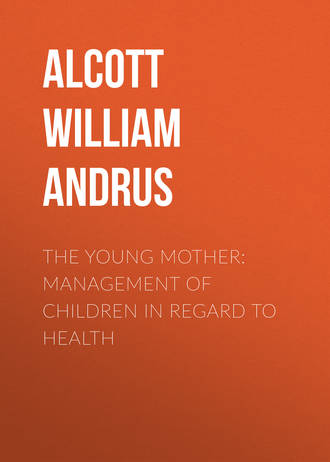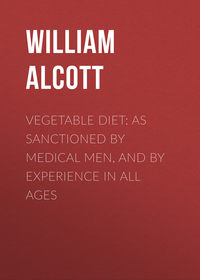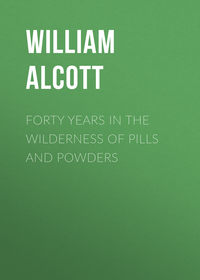
The Young Mother: Management of Children in Regard to Health
Did you treat him precisely as you did the others?
"Yes, as far as regarded principles; that is, I permitted him to bear as much of cold, heat or wet as his constitution would endure without pain or injury. The degrees, however, were very different from those his brothers bore, had they been determined by the measurement of the thermometer, but precisely the same in effect, as far as could be ascertained by consequences. Thus, if he were exposed to the same temperature as his brothers, he experienced no more inconvenience from it, when it was very low, than they, because he had additional covering to protect him."
CHAPTER XVII.
SOCIETY
Duty of mothers in this matter. Children prefer the society of parents. Importance of other society. Necessity of society illustrated. Early diffidence. Selecting companions for children. Moral effects of society on the young. Parents should play with their children.
Every mother is unquestionably as much bound to have an eye to the society of her child, as to his food, drink or clothing. And if the quality, amount and general character of the latter are important, those of the former are by no means less so.
It is indeed true that many a child has been happy, in a degree, in the society of its mother alone, where the father was seldom seen, and the brothers and sisters never. And it is equally true; that a few children have so far preferred the society of their parents alone, as to become disinclined to other society. But cases of this kind are only as exceptions to the general rule; and are probably monstrous formations of character. I cannot believe that any child, rightly educated, would prefer the society of none but its parents, or even its parents and brothers and sisters.
A French author has written a considerable volume on the importance of what he calls gaiety, but which he should prefer to call cheerfulness. Among the rest, he maintains that it is indispensable to the best health. But if so—and I do not doubt it—then it ought to be encouraged in children, and the earlier the better. Now there is no way to encourage cheerfulness in the young so effectually as by indulging them with considerable society.
That the thing may be carried to excess, I have no doubt. I have seen mothers who permitted their children to play with their mates till they became excited, and were thus led to continue their sports, not only farther than cheerfulness and health demanded, but until they were excessively fatigued, and almost made sick. And I believe that the excitement of numbers, in infant and other schools, may be so great as to be injurious, rather than salutary. Still I think these are rare cases.
Truth usually lies somewhere between extremes. To keep a child, especially a boy, always in the nursery, or even in the parlor with his mother, is one extreme; and to let him go abroad continually, till his home and its smaller circle become insipid, is the other. A child properly trained will usually prefer home, and only desire to go abroad occasionally. He will rather need urging in the matter than require restraint.
But he must, at any rate, be taught to be sociable, not only for the salve of cheerfulness and the consequent health, but for the sake of his manners, his mind, and his morals.
If it is a matter of indifference, in the formation of human character, whether we mix in society or not, then, for anything I can see, an improvement might be proposed in the construction of the material universe. Instead of forming the planets so large—and this earth among the rest—each might have been divided into hundreds of millions; and every human being might have had a little planet, and an immortality, exclusively his own. Such an arrangement would certainly prevent a great many evils; and, among the rest, a great deal of quarrelling and bloodshed.
But divine wisdom is higher than human wisdom, and one world to hundreds of millions of human beings has been made, instead of giving to each individual of the universe a little world of his own, in which he might have reigned sole monarch, and only wept, with Alexander, because none of the other worlds were within his grasp. Where a family is already large, other society will be unnecessary for some time; but where it consists of a mother only, although her society is always to be considered of the first importance, I cannot but think she ought to take great pains to introduce her child occasionally to the company of other children.
That diffidence, which almost destroys the influence and the happiness of many individuals, is often cherished, if not created, by too much seclusion. Where there is a natural constitution which predisposes the child to timidity and diffidence, the danger is greatly increased; and parents should take unwearied pains to guard against it.
It is hardly necessary for me to say, that great care should also be used in selecting the companions of children. Their character will be greatly influenced for life by their earlier associates. Friendships between children are sometimes formed, while playing together, which are interrupted only by death. Those parents who are so fond of controlling the choice of their sons and daughters in regard to a companion for life, at a period when control is generally resisted, would do well to take a hint from what has here been suggested. There is no doubt but they might often—very often—give such a direction to the embryo affections of their infants and children, as would terminate only with their existence.
It is still less necessary to advert, in a work like this, to the effect which much observation and experience shows good society to have on purity, both physical and moral. Every one must have observed its tendency to form habits of cleanliness, not to say neatness. There may be excess, even in this. Young persons, of both sexes, often spend too much time in preparing their dress for the reception or the visiting of their friends. Still this is only the abuse of a good thing. Nor is it less true, though it may be less obvious, that moral purity is more likely to be secured where children and youth of both sexes associate a great deal, from the earliest infancy.22 There are tremendous cases of declension on record, which establish this point beyond the possibility of debate.
To say that the mother—and indeed both parents—ought to form a part of the playing circle of the youngest children, in order to watch their opening dispositions, to check what may be improper, and encourage what ought to be encouraged, would be only to repeat what has often been recommended by the best writers on education—but which must be repeated, again and again, till it leaves an impression, especially on CHRISTIAN parents. It is strange that many regard this matter as they do, and appear not only ashamed to be seen sporting with their children, but almost ashamed to have their children thus occupied. They might as well be ashamed of the gambols of the kitten or the lamb; or of the grave mother, as she turns aside occasionally to join in its frolics. When will parents be willing to take lessons in education from that brute world which they have been so long accustomed to overlook or despise?
CHAPTER XVIII.
EMPLOYMENTS
Influence of mothers over daughters. Anecdote of Benjamin West. Anecdote of a poor mother. Of set lessons and lectures. Daughters under the mother's eye. Why young ladies, now-a-days, dislike domestic employments. Miserable housewives—not to be wondered at. Mistake of one class of men. Mr. Flint's opinion.
One important and never-to-be-forgotten employment of the young is the cultivation of their minds; and another, that of their morals. But my present purpose is only to speak of those employments denominated manual, or physical.
It is obvious, at the first glance, that the influence of the mother, in our own country, at least, will be less over boys than over girls. We leave it to savages and semi-savages to employ their females, and even their mothers, in hard manual labor. Here, in America, what I should say on the employment of boys would be more properly addressed to the YOUNG FATHER.
There are some exceptions to the general truth contained in the last paragraph. Many a mother has—unconsciously at the time, but with no less certainty than if she had done it intentionally—given a direction to the whole current of her son's life; and this, too, at a very early period. The mother of Benjamin West, the painter, if she did not give the first tendency to his favorite pursuit, while he was yet a mere child, at the least greatly confirmed him in it, by the manner of expressing her surprise at one of his early performances. "My mother's kiss," on that occasion, said he, "made me a painter." Nor are facts of the same general character by any means uncommon.
I know a poor mother who, in the absence of her husband at his weekly or monthly labors, used to detain her eldest boy, then almost an infant, from going to bed in the evening till her day's work was finished—because, in her loneliness, she wanted his company—by telling stories of eminent men, and especially of distinguished philanthropists, until she had unconsciously kindled in him a philanthropic spirit, which will not cease to burn till his death.
But it is in forming the predilections of daughters for their destined employments, that mothers are especially influential. Not so much by their set lessons or lectures, however, as by the force of continued example. No mother who sends her child away to be nursed, and subsequently to her return seizes on every possible opportunity to keep her out of the way and out of her sight, will be likely to give her any choice of employment, or indeed any fondness for employment at all.
Nor is it sufficient that she keep her daughter constantly under her eye, with a view to qualify her for the duties of a housewife, if the daughter see as plainly as in the light of mid-day, that the mother dislikes the employment herself. She must love what she would have her daughter love, and even what she would have her understand. Nor is it sufficient that she affect a fondness for the employment; her love for it must be real. Little girls have keener eyes and better judgments than some mothers seem willing to believe or to admit.
Many persons seem greatly surprised that the young ladies of modern days have so little fondness for domestic life and domestic duties. How few, it is often said, will do their own housework, if they can possibly get a train of domestics around them; even though the care and oversight of the domestics themselves gear them out more rapidly than bodily labor would.
But there is a reason for this hostility to domestic employments. It is because mothers, almost universally, consider their occupations as mere drudgery, and bring up their children in the same spirit. And what else could be expected as the result? It would be an anomaly in the history, of human nature, if the female members of families were to grow up in love with ordinary domestic avocations, when they have been accustomed to see their mothers, and nurses, and elder sisters complaining and fretting while engaged in them; and showing by their actions, no less than by their words, that they regarded themselves as miserable and wretched.
No wonder so many girls, of the present day, make miserable housewives. No wonder a factory, a book-bindery, or a shoemaker's shop, is considered preferable to the kitchen. No wonder the world degenerates, because females, no longer healthfully employed, become pale and sickly, spreading gloom and misery all around them, and transmitting the same ills which themselves suffer to those who come after them.
It is true, the guilt of this dereliction must not be charged wholly on mothers; though they ought, unquestionably, to bear a large share of it. Those who have, and ought to have, much influence in society, erroneously, and I suppose thoughtlessly, help mothers along in their evil ways. If there were a universal combination between certain classes of mankind and the whole race of mothers, to ruin, rather than be instrumental of reforming mankind, and of saving their deathless souls, I hardly know how they could invent a much better, or at least a much more certain plan, than that now in operation. So long as those who take the lead in society, and govern the fashion in this matter, as others govern it in the matter of dress, refuse, as a general rule, to form alliances for life, except with those who practically despise house-hold concerns—and so long as our houses are filled with domestics, whose object is to aid these spoiled mothers, but whose real effect is to complete their ruin, and accelerate the ruin of mankind—just so long will human progress towards perfection be retarded.
If mothers were in love with their occupations, and their daughters knew it, then to the influence of a good example they could add many lessons of instruction. These might be given in the way of natural, unstudied conversation, and thus be not only heard with attention, but sink deep. If the world is ever to be reformed, says Mr. Flint, in his Western Review, woman, sensible, enlightened, well educated and principled, must be the original mover in the great work. Every one who has considered well the extent and nature of female influence, will concur in the sentiment; and if he have one remaining particle of devotion to the Father of spirits, he will send up the most fervent petitions to his throne of mercy in behalf of this often depressed or enslaved half of the human race, that they may speedily be emancipated, and become as conspicuous in human redemption, as they have sometimes been in human condemnation.
CHAPTER XIX.
EDUCATION OF THE SENSES
Improving the senses. Examples of improvement. SEC. 1. Hearing—how injured—how improved.—SEC. 2. Seeing—how injured.—SEC. 3. Tasting and smelling—how benumbed—how preserved.—SEC. 4. Feeling. The blind. Hints to parents. Education of both hands.
Man is much less useful and happy in this world than he would be, if more pains were taken by parents and teachers, as well as by himself, to cultivate his senses—hearing, seeing, feeling; tasting, and smelling—and to preserve their rectitude.
The extent to which the senses can be improved or exalted, can best be understood by observing how perfect they become when we are compelled to cultivate them. Thus the blind, who are obliged to cultivate hearing, feeling, and smelling, often astonish us by the keenness of these senses. They will distinguish sounds—especially voices—which others cannot; and with so much accuracy, as to remember for several years the voice of a person in a large company, which they hear but once. They will also distinguish small pieces of money, different fabrics and qualities of cloth, &c.; and, in walking, often ascertain, by the feeling of the air, or by other sensations, when they approach a building, or any other considerable body. So the North American Indian, whose habits of life seem to require it, can hear the footsteps of an approaching enemy at distances which astonish us. So also the deaf and dumb are very keen-sighted, and generally make very accurate observations. Any reader who is sceptical in regard to the cultivation of the senses, would do well to consult the account of Julia Brace, the deaf and dumb and blind girl, as published in some of the early volumes of the "Annals of Education."
But it is hardly necessary to resort to the blind, or to savages, or to the deaf and dumb, in order to prove man's susceptibility in this respect. We may be reminded of the same fact by observing with what accuracy the merchant tailor can distinguish, by feeling, the quality of his goods; how quick a painter, an engraver, or a printer, will discover errors in painting or printing, which wholly escape ordinary readers or observers; and how quick the ear of a good musician will discover the existence and origin of a discordant sound in his choir.
Now I do not undertake to say or prove, that mankind would be better or happier for having their senses all cultivated in the highest possible degree; though I am not sure that this would not be the case. But so long as a large proportion of our ideas enter our minds through the medium of the five senses, it is desirable that something should be done to perfect them, instead of overlooking the whole subject. What mothers ought to do in this matter, deserves, therefore, a brief consideration.
SEC. 1. HearingThe suggestion, in another place, to keep away caps from the child's head, if duly attended to, is one means of perfecting, or at least of preserving, the sense of hearing. For caps, by the heat they produce to a part which cannot safely endure an increase of temperature, greatly expose children to catarrhal affections; and many a catarrh has laid the foundation for dulness of hearing, if not of actual deafness.
The ears should be kept clean. If washed sufficiently often, and syringed once a week with warm milk and water, or with very weak soap-suds, gently warmed, the cerumen or ear wax will hardly be found accumulated in such masses as to produce deafness. And yet such accumulations, with such consequences, are by no means uncommon. It is not long since a young man with whom I am acquainted, applied to an eminent surgeon of Boston, on account of deafness in one ear, which had become quite troublesome, and as it was feared, incurable. Syringing with a large and strong syringe disengaged a large mass of cerumen, and hearing was immediately restored.
Children should be taught to distinguish sounds with closed eyes, or blindfolded. We may strike on various objects, and ask them to tell what we struck, &c. This will lead them to observe sounds; and will perfect their hearing in a remarkable degree.
There are also advantages to be derived from accustoming a child to a great variety of sounds; both as regards their strength and character. But this must only be occasional; for if the ear be constantly accustomed to sounds of any kind, and more especially those which are harsh or loud, the organ of hearing is liable to sustain injury. Music, as it is now beginning to be taught to children in our schools, will do much, I think, to improve the faculty of hearing.
SEC. 2. SeeingThe sight, says Addison, is the most perfect of all our senses; and this is unquestionably true. But it is more or less perfect, in different individuals, according to the early education they have received. Sometimes, it is true, we are born near-or dim-sighted; but such cases are comparatively rare.
The question is sometimes asked why there are so many persons, now-a-days, who lose their sight, become near-sighted, &c. very young. It may be difficult to answer this question fully; yet I cannot help thinking that the following are some of the causes.
1. The great heat of our apartments, which, together with late hours and much lamp light, affects the eyes unpleasantly, is believed to be among the more prominent causes of early decay of sight. Formerly, our apartments were neither so steadily nor so generally heated; and we rose earlier, and consequently went to bed earlier.
2. The fine print of a large proportion of our books, especially our school books, has done immense injury. I do not believe that reading fine print, occasionally, for a few moments at a time, or reading by a very strong or very weak light in the same way, does harm. On the contrary, I think it may strengthen and improve the sight. It is the long continuance of these things that does the mischief; and the mischief thus done is immense. I rejoice that printers and publishers are beginning of late to use much larger type than they have done for some years past.
3. The early use of spectacles does mischief—I mean before they are needed. After they begin to be needed, there is no advantage in delaying to use them, as some do, for fear they shall wear them too soon. This is about as wise as the practice of going cold to harden ourselves.
4. Reading when we are fatigued, or ill, or have a very full stomach, is another way to injure the sight.
5. Rubbing the eyes with the fingers, or with anything else, does inevitable mischief. The Germans have a proverb which says—"Never touch your eye, except with your elbow." There is much of good sense in it.
In short, there are a thousand ways in which that delicate organ, the human eye, may sustain injury; and nearly as many in which it may be strengthened, cultivated, and improved. But my limits merely permit me to add, that the frequent but gentle application of water to the eye, several times a day, at such a temperature as is most agreeable—but cold, when it can be borne—is one of the best preservatives of sight which the world affords.
Connected alike with physical and intellectual education, is the practice of measuring by the eye heights, distances, superfices, weights, and solids. It is not difficult to train the eye to an accuracy in this matter which would astonish the uninstructed.
SEC. 3. Tasting and SmellingI do not know that it is worth our while to take pains, by any direct methods, to cultivate the organs of taste or smell; but I think it proper, at the least, to preserve their original rectitude.
Many, I know, undertake to say, that were it not for our errors in regard to food and drink, and were it not, in particular, for the multitude of strange mixtures which tend to benumb those two senses, we might determine the qualities of food and drink—whether they are favorable or adverse—by means of taste and smell, like the animals. But I do not believe this. The Creator has substituted reason, in us, for instinct in the brute animals. It is not necessary that we should possess the latter, when the former is so manifestly superior to it; and accordingly I do not believe that it is given us, or any of that acuteness of sensation which exists in the dog, the tiger, the vulture, &c.—and which so closely resembles it.
There can be no doubt—no reasonable doubt, certainly—that the wretched customs of modern cookery benumb the senses of taste and smell, more or less, and that high-seasoned food, condiments, and stimulating drinks do the same; and should for this reason, were it for no other, be studiously avoided.
Closely connected with the organ of taste are the TEETH. A volume might profitably be written on these—as on the eye. But I will only say that they should be kept perfectly clean, either by rinsing or brushing, or both, especially after eating; that they should be permitted to chew all our food, instead of merely standing by as silent spectators to the passage of that which is mashed, soaked, chopped, &c.; that they should not be picked or cleaned with pins, or other equally hard instruments; that they should not be used to crack nuts or other hard, indigestible substances; and that the stomach, with which they are apt to sympathize very strongly, should also be kept in a good and healthy condition.
SEC. 4. FeelingCorpulence and slovenliness are generally among the more prolific sources of a want of acuteness in feeling. The first is a disease, and may be avoided by a proper diet, and by active mental and bodily employment. Slovenliness we may of course avoid, whenever there is a wish to do so, and an abundance of water.
But the sense of feeling, or especially that accumulation of it which we call TOUCH, and which seems to be specially located in the balls of the fingers and on the palm of the hand, is susceptible of a degree of improvement far beyond what would be the natural result of cleanliness, and freedom from plethora or corpulence.
I have already alluded, in my general remarks at the head of this chapter, to the acuteness of this sense in the blind, as well as in the dealer in cloths. I might add many more illustrations, but a single one, in relation to the blind, which was accidentally omitted in that place, will be sufficient.
The blind at the Institution in this city, as well as in other similar institutions, are now taught to read and write with considerable facility. But how? Most of my readers may have heard how they read, but I will describe the process as well as I can. A description of their method of writing is more difficult.
The letters are formed by pressing the paper, while quite moist, upon rather large type, which raises a ridge in the line of every letter, and which remains prominent after the paper is dry. In order to read, the pupil has to feel out these ridges. A circular ridge on the paper he is told is O; a perpendicular one, I; a crooked one, S; &c. They read music and arithmetic printed in a similar manner. A few months of practice, in this way, will enable an ingenious youth to read with considerable ease and despatch.





